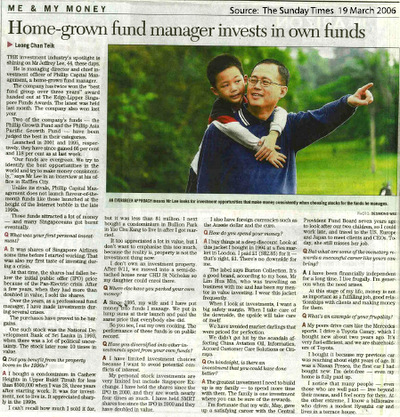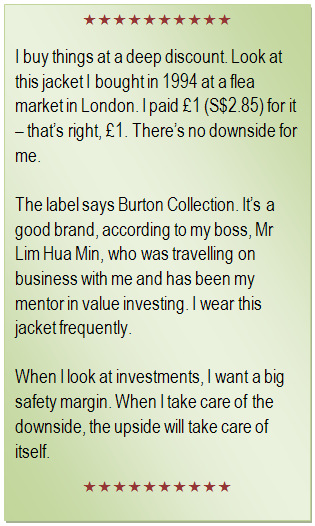Author's note: Recently, while surfing the Phillip Capital website, I came across an article which I wrote for The Sunday Times' Me & My Money series when I was still working there. In the article, I interviewed Jeffrey Lee, the chief investment officer of Phillip Capital Management.
Reading this article again some six years after it was first published, I rediscovered insights --- his road to financial freedom, his personal values regarding money and how they shape his professional money management, etc. I thought it would only benefit you if I reproduced it. You can read it in the original at the Phillip website too by clicking here.

THE INVESTMENT SPOTLIGHT is shining on Mr Jeffrey Lee, 44, these days.
He is managing director and chief investment officer of Phillip Capital Management, a home-grown fund manager.
The company has twice won the “bet fund group over three years” award handed out at The Edge-Lipper Singapore Funds Awards. The latest was held last month. The company also won last year.
Two of the company’s funds – the Phillip Growth Fund and the Phillip Asia Pacific Growth Fund – have been judged the best in their categories.
Launched in 2001 and 1995, respectively, they have since gained 66 per cent and 118 per cent as at last week.
“Our funds are evergreen. We try to identify the best opportunities in the world and try to make money consistently,” says Mr Lee in an interview at his office in Raffles City.
Unlike its rivals, Phillip Capital Management does not launch flavor-of-the-month funds like those launched at the height of the Internet bubble in the late 1990s.
Those funds attracted a lot of money – and many Singaporeans got burnt eventually.
Q: What was your first personal investment?
A: it was shares of Singapore Airlines some time before I started working. That was also my first taste of investing during a crisis.
At that time, the shares had fallen below the IPO price because of the Pan-Electric crisis. After a few years, when they had more than doubled in value, I sold the shares.
Over the years, as a professional fund manager, I have made investments during several crises.
The purchases have proved to be bargains.
One such stock was the National Development Bank of Sri Lanka in 1993, when there was a lot of political uncertainty. The stock later rose 10 times in value.
Q: Did you benefit from the property boom in the 1990s?
A: I bought a condominium in Cashew Heights in Upper Bukit Timah for less than $500,000 when I was 28, three years after starting work. It was for investment, not to live in. It appreciated sharply in the 1990s.
I can’t recall how much I sold it for, but it was less than $1 million. I next bought a condominium in Bullion Park in Yio Chu Kang to live in after I got married.
It too appreciated a lot in value, but I don’t want to emphasise this too much because the reality is, property is not the investment thing now.
I don’t own an investment property. After 9/11, we moved into a semi-detached house near CHIJ St Nicholas so my daughter could enroll there.

Q: Where else have you parked your own money?
A: Since 1995, my wife and I have put money into funds I manage. We put in lump sums at their launch and paid the same price that everybody else did.
So you see, I eat my own cooking. The performance of these funds is on public record.
Q: Have you diversified into other investments apart from your own funds?
A: I have limited investment choices because I want to avoid potential conflicts of interest.
My personal stock investments are very limited but include Singapore Exchange. I have held the shares since the IPO in 2000, and they are worth nearly four times as much. I have held SMRT shares too since the IPO in 2000 and they have doubled in value.
I also have foreign currencies such as the Aussie dollar and the euro.
Q: How do you spend your money?
A: I buy things at a deep discount. Look at this jacket I bought in 1994 at a flea market in London. I paid £1 (S$2.85) for it – that’s right, £1. There’s no downside for me.
The label says Burton Collection. It’s a good brand, according to my boss, Mr Lim Hua Min, who was travelling on business with me and has been my mentor in value investing. I wear this jacket frequently.
When I look at investments, I want a big safety margin. When I take care of the downside, the upside will take care of itself.
We have avoided market darlings that were priced for perfection.
We didn’t get hit by the scandals affecting China Aviation Oil, Informatics, Accord Customer Care Solutions or Citiraya.
Q: On hindsight, is there an investment that you could have done better?
A: The greatest investment I need to build up is my family – to spend more time with them. The family is one investment where you can be sure of the rewards.
I’m fortunate that my wife, May, gave up a satisfying career with the Central Provident Fund Board seven years ago to look after our two children, so I could work late, and travel to the US, Europe and Japan to meet clients and CEOs. Today, she still misses her job.
Q: But what are some of the monetary rewards a successful career like yours can bring?
A: I have been financially independent for a long time. I live frugally. I’m generous when the need arises.
At this stage of my life, money is not as important as a fulfilling job, good relationships with clients and making money for them.
Q: What’s an example of your frugality?
A: My peers drive cars like the Mercedes sports. I drive a Toyota Camry, which I bought new about two years ago. It’s very fuel-efficient, and we are shareholders of Toyota.
I bought it because my previous car was reaching about eight years of age. It was a Nissan Presea, the first car I had bought new. I’m debt-free – even my home is fully paid up.
I notice that many people – even those who are well paid – live beyond their means, and I feel sorry for them. At the other extreme, I know a billionaire who drives a modest Hyundai car and lives in a terrace house.








I am eager to know the story ...
please tell us ...
have a good weekend
There are many ways to make money. This is one of the ways. Next time, I can share with you, the story of a friend. He is an aggressive fund manager who made USD 250m over 6 years. And is now a retired investor.